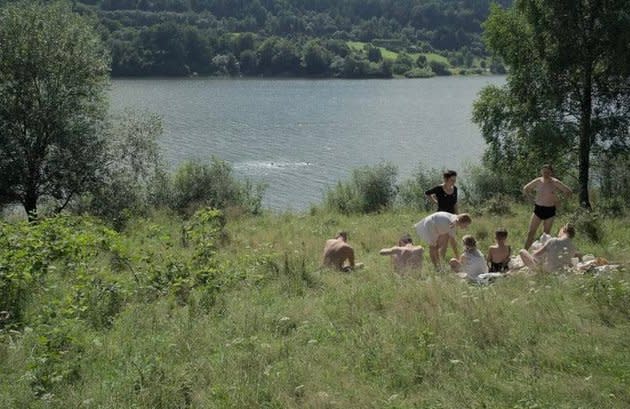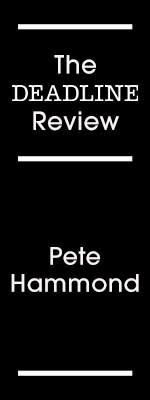‘The Zone Of Interest’ Review: Jonathan Glazer’s Stunning Look At The Holocaust In A Way It Has Not Been Seen – Cannes Film Festival


The title of Jonathan Glazer’s The Zone of Interest refers to how the Germans labeled the 40-square-kilometer area that surrounded the Auschwitz concentration camp on the outskirts of Oświęcim, Poland. This is where the writer-director has set this unique Holocaust film with a perspective and focus on what was on the other side of a wall separating the most horrific mass murder and terror in human history, and the daily, almost bucolic lives of those who caused it or were in complete denial of it. Yes, Holocaust movies are virtually a genre of their own, but I can safely say I have never seen one, sans any visuals of violence and suffering, that still manages to be just as harrowing and frightening, maybe even more. The Zone of Interest takes its place among the great films made on the Holocaust and will probably haunt you long after seeing it.
Glazer (Under the Skin, The Fall) took his inspiration from the 2014 book by Martin Amis, but decided to concentrate on the lives of the Commandant of Auschwitz, Rudolf Hoss (Christian Friedel), his wife Hedwig (Sandra Hüller), their children, servants, assorted family, and others weaved in and out of the large, light and airy home built just on the edge of the camp but separated by a wall of ivy, lilac bushes and an ever-growing garden created by Hedwig to make this a beautiful atmosphere. Employing a unique filming technique, Glazer uses 10 cameras in fixed positions in various rooms that are remotely operated by focus pullers in order to get a natural sense of the everyday life going on, as smoke billows up in the otherwise bright blue skies, an imposing guard tower can be seen in the distance, and most hauntingly sounds of horror and death and gunshots softly heard from the other side.
More from Deadline
The film opens with just its title fading into a stark black screen that remains for several minutes accompanied by some imposing music (the spare score is by Mica Levi). Finally we see a picture, and it is an idyllic one with a family sunning themselves in lush green surroundings by the river. This could be a picnic for any family, but we soon will find out this is not just any family. It leads to various snapshots of this very different lifestyle in the shadow of a death camp. At her beautifully appointed home, Hedwig feels like this is some sort of utopia, exactly what was promised to Germans by Hitler and he delivered on it so that the business at hand could be accomplished as they live in denial. “The Jews are over the wall,” she casually mentions at one point, clearly blocking any other thought of what was going on there. A business meeting run by her husband features matter-of-fact talk about updating crematoriums for more efficiency and talk about disposing of various groups. “I believe there is one ready, all Dutch I think,” Rudolf says with no emotion.
RELATED: Cannes Film Festival Full Coverage
Their kids play with toy soldiers, a young son has a Nazi uniform, the family dog runs carefree through the house. Servants tend to keeping everything spotless, family gatherings are common. Before going to sleep in separate beds, Hedwig tells her husband she longs to return to that wonderful Italian spa where they once vacationed. Things for the Hoss family could not be better, their “dream life” now a reality, as Hedwig says. There isn’t much plot until Rudolf, an up and comer in the Third Reich, gets the news they are moving him close to Berlin. This causes major friction in his marriage as Hedwig confronts him while standing on the edge of the lovely river where he swims and boats with the kids. She does not want to move. Auschwitz, their Auschwitz, is a paradise, the perfect place to raise their family. He works on convincing his superiors to let them stay as he leaves to take on the expanded duties overseeing the entire concentration camp operation.
Most of the film is centered around this community, but later on, once he travels, we do see Rudolf in Berlin at a lavish Nazi party; later, on the phone to his wife who asks about the people who were there, he replies, “I didn’t really notice, I was just thinking how I might gas a group like this with ceilings so high.”
RELATED: Full List Of Cannes Palme d’Or Winners Through The Years: Photo Gallery
Glazer says he researched all this for two years, worked with the Auschwitz Museum and other organizations, and unlike the book he used the real-life people rather than fictional names, keeping it as authentic as possible. The technology that kept the crew off the set allowed actors to improvise at times and all of this adds up to a stunning view of the atrocities committed by these people but without ever seeing them. Making it violence-free also makes it feel less exploitative, something Glazer clearly was striving for. The closest we come is when a cleaning team is seen entering one of the crematoriums as if they were making up a hotel room, vacuuming and Windex-ing large glass windows separating them from a devastating visual of thousands of shoes once worn by those incinerated here.
RELATED: Cannes Film Festival 2023 In Photos
Hüller (Toni Erdmann) and Friedel carry the load in terms of the cast, but all do fine work. The production design by Chris Oddy is a marvel, allowing all those cameras (Lukasz Zal is the cinematographer) to capture this entire home in real time. The sound design of all the muted noises, screams, shots and commands, coming from the camp is especially haunting and effective throughout. At a time where, incredibly, Nazism, Holocaust denial and antisemitism are back in favor in some corners of the globe including America, this movie is a reminder of the horror and the denial of that horror from an unusual perspective that should make us very afraid.
Producers of the film shot on location in Poland are Jim Wilson and Ewa Puszczynska. It had its world premiere tonight in competition at the Cannes Film Festival.
Title: The Zone of Interest
Festival: Cannes (Competition)
Distributor: A24
Director-screenwriter: Jonathan Glazer
Cast: Christian Friedel, Sandra Hüller
Running time: 1 hr 45 min
Best of Deadline
Sundance Film Festival 2024 Photos: 'Rob Peace' & 'In The Summers' On Day 5
Palm Springs Film Festival: 'The Holdovers' Star Paul Giamatti Set For Icon Award
Sign up for Deadline's Newsletter. For the latest news, follow us on Facebook, Twitter, and Instagram.

 Yahoo News
Yahoo News 